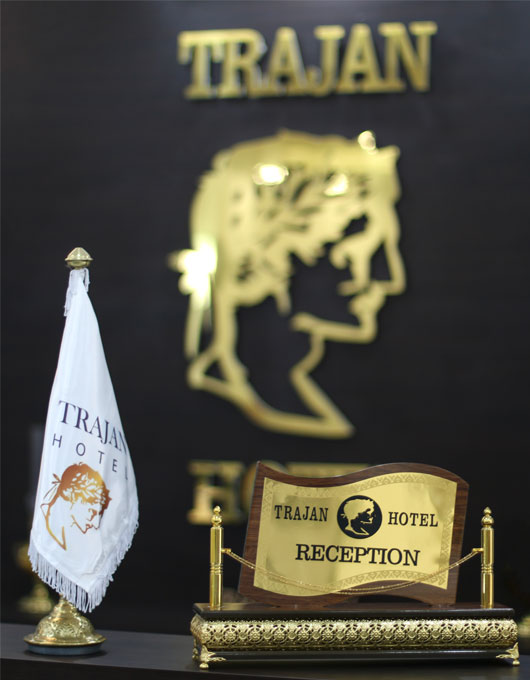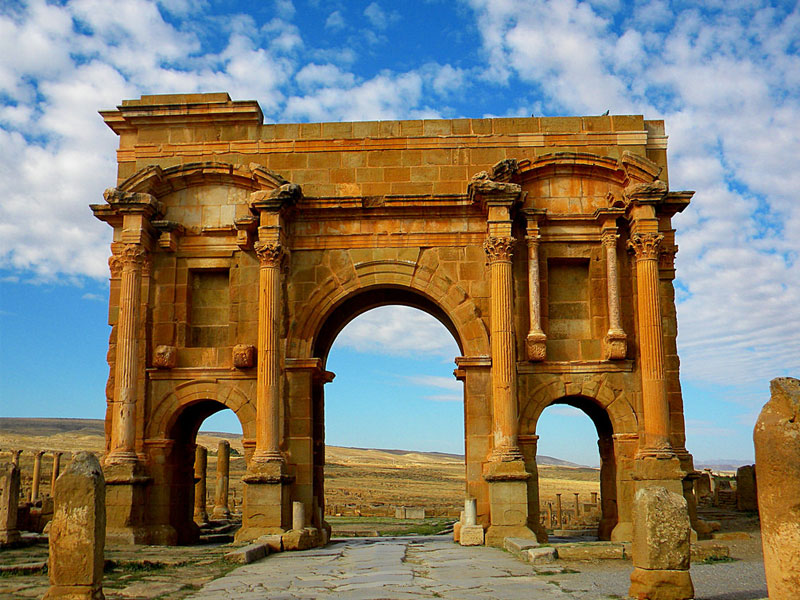Wilaya de Batna, ALGERIA
+213 (0)33 211 414
The TRAJAN HOTEL is a 4-star hotel located 80 meters from the Roman archaeological site of Timgad (UNESCO World Heritage Site) and 36 km from the administrative center of the wilaya (department) of Batna.
With a capacity of 55 beds, the TRAJAN HOTEL has 20 rooms, including 4 luxurious Suites, and provides its customers with quality services and the height of their requirements.
Due to its proximity to one of the world's largest archaeological sites and the open-air theater of Timgad, the TRAJAN HOTEL offers these guests the opportunity to combine modernity, well-being and culture.
In addition to the warm welcome offered by TRAJAN HOTEL, you have a Restaurant offering varied and traditional menus and a Cafeteria open 24H/24H.
During your stay, you have the opportunity to enjoy the terrace of the TRAJAN HOTEL and its VIP lounge which offers a panoramic view of the archaeological site of Timgad and the high mountains of Aures. The terrace is accessible via elevator and is equipped with all amenities.
Always looking to better serve its customers, the TRAJAN HOTEL has a Arts and Crafts Gallery offering multiple gift ideas and souvenirs. Local and national artists and artisans exhibit their works and articles such as paintings, sculptures, carpets, ceramics, jewelery etc.
For the comfort and tranquility of its guests, TRAJAN HOTEL offers private parking, disabled access, a smoking area and an elevator to access the rooms. A remote monitoring system is put in place to ensure security throughout the hotel.
Our slogan : Satisfy and retain our customers.
We organize, and at your request, excursions in the Aures region to allow you to discover its richness as much cultural as historical.
Discover our circuits studied exclusively to better serve youTo discover and love Algeria
TOURIST TOURS on Request
TRAJAN HOTEL - TIMGAD
Trajan, (Latin : Imperator Caesar Nerva Traianus Divi Nervae filius Augustus 18 September 53 – 8 August 117) was Roman emperor from 98 to 117 . Officially declared by the Senate optimus princeps ("the best ruler"), Trajan is remembered as a successful soldier-emperor who presided over the greatest military expansion in Roman history, leading the empire to attain its maximum territorial extent by the time of his death. He is also known for his philanthropic rule, overseeing extensive public building programs and implementing social welfare policies, which earned him his enduring reputation as the second of the Five Good Emperors who presided over an era of peace and prosperity in the Mediterranean world.
Trajan was born in the city of Italica (close to modern Sevilla, Spain), a Roman settlement in the province of Hispania Baetica. Although misleadingly designated by some later writers as a provincial, his family came from Umbria and he was born a Roman citizen. Trajan rose to prominence during the reign of emperor Domitian. Serving as a legatus legionis in Hispania Tarraconensis, in 89 Trajan supported Domitian against a revolt on the Rhine led by Antonius Saturninus. In September 96, Domitian was succeeded by Marcus Cocceius Nerva, an old and childless senator who proved to be unpopular with the army. After a brief and tumultuous year in power, culminating in a revolt by members of the Praetorian Guard, Nerva was compelled to adopt the more popular Trajan as his heir and successor. He died on 27 January 98 and was succeeded by his adopted son without incident.
As a civilian administrator, Trajan is best known for his extensive public building program, which reshaped the city of Rome and left numerous enduring landmarks such as Trajan's Forum, Trajan's Market and Trajan's Column. Early in his reign, he annexed the Nabataean Kingdom, creating the province of Arabia Petraea. His conquest of Dacia enriched the empire greatly, as the new province possessed many valuable gold mines. Trajan's war against the Parthian Empire ended with the sack of the capital Ctesiphon and the annexation of Armenia and Mesopotamia. His campaigns expanded the Roman Empire to its greatest territorial extent. In late 117, while sailing back to Rome, Trajan fell ill and died of a stroke in the city of Selinus. He was deified by the Senate and his ashes were laid to rest under Trajan's Column. He was succeeded by his adopted son Hadrian.
In a mountainous site of great beauty, north of the Aures massif, 480 km southeast of Algiers, and 110 km south of Constantine, Timgad offers the example of a military colony Roman created ex nihilo. The Colonia Marciana Traiana Thamugadi was founded in the year 100 AD by Trajan, probably to serve as a camp for the 3rd Legion Augustus, which was later confined to Lambèse. The plan, of great rigor, illustrates the principles of Roman town planning at its peak. The rapid growth of the city led, in the middle of the second century, to explode the narrow framework of the original foundation. Timgad is growing out of the ramparts and major public buildings are built in the new districts: capitol, temples, markets, baths. Most date back to the time of the Sévères, where the city knew its golden age which also testify immense private residences.
Source : UNESCO - World Heritage Center (read the article on the UNESCO website)


